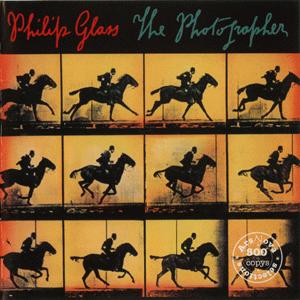
..:: audio-music dot info ::.. |
| A l b u m D e t a i l s |
 |
Label: | Ars Nova |
| Released: | 1983 | |
| Time: |
42:14 |
|
| Category: | Classical | |
| Producer(s): | Kurt Munkacsi, Philip Glass | |
| Rating: | ****...... (4/10) | |
| Media type: | CD |
|
| Web address: | www.philipglass.com | |
| Appears with: | Ravi Shankar |
|
| Purchase date: | 2003.12.24 | |
| Price in €: | 1,00 | |
| S o n g s , T r a c k s |
| A r t i s t s , P e r s o n n e l |
| C o m m e n t s , N o t e s |
1999 CS Epic PMT-37849
1999 CD Epic MK-37849
1999 LP Epic FM 37849
1990 CD Columbia 37849
1983 CD Atlantic MK37849
1983 LP Epic 25480
Eadweard Muybridge (1830-1904), born in Kingston-on-Thames, left England to undertake the study of photography and soon became one of the pioneers in the new field. Beginning with a series of photographic assignments for the United States government, he became well known as a landscape photographer, principally of the far West and, later, Central America. However, his studies of the human figure and animals in motion, begun in 1872, are the works by which he is mainly known today. This project, which occupied almost the entire remainder of his life, was undertaken to prove a bet -that at one time during its stride a trotting horse has all four feet off the ground (see cover photograph). His many inventions during this period of his life not only contributed to the development of photography but anticipated and laid the ground for the development of motion pictures.
Almost forgotten now are other events of his life. Muybridge, having
married in his early forties, discovered through letters sent to his
wife, Flora, that she had a lover, Colonel Larkyns. On October 17,
1874, Muybridge sought out Colonel Larkyns at the Yellow Jacket
quicksilver mines not far from San Francisco. He greeted Larkyns with
the words, "Good evening Major, my name is Muybridge and here is the
answer to the letter you sent my wife." Muybridge then shot Larkyns,
killing him on the spot. The subsequent trial in San Francisco was
international news, Muybridge by then being quite well known. In the
end he was acquitted, Larkyn's child borne by his wife, was
subsequently raised by Muybridge after his wife's death a few years
later.
The Photographer, a music/theater piece, was planned as a three-part work -a play, a concert and a dance.
Act I recounts the events in the life of Eadweard Muybridge relating to the murder of Colonel Larkyns and the subsequent trial. The music in Act I consists of three "incidental pieces (two of them recorded here) which fit into the play. For the first song, "A Gentleman's Honor," words were taken from the trial transcript, comments of spectators at the trial and letters of Muybridge to his wife Flora.
Act II is presented as a concert with violin solo (played here by Paul Zukofsky) during which photographs taken by the Muybridge of the play in Act I are developed and projected on a screen at the rear of the stage.
Act III brings back all the characters from Act I (Muybridge, his wife, Flora, Colonel Larkyns, et al) in a final dance.
The Photographer, based on events in the life of Eadweard Muybridge, was conceived by the Dutch director/designer Rob Malasch in association with Philip Glass. It was commissioned by the 1982 Holland Festival and was performed by DeGroep with costumes by Aage Hoygaard and decor by Rein Jansma and Joost Elffers at a preview performance for Queen Beatrix and Prince Claus. The preview took place at the Royal Palace in Amsterdam, in May 1982 with Michael Riesman conducting. The work received its first public performance at the Carré Theater in Amsterdam in June 1982 as part of the Holland Festival.
Philip Glass
Composing the music for a theater piece revolving around the life and work of photographer Eadweard Muybridge must have seemed a natural fit for Philip Glass, as Muybridge's stop action studies of people and animals in motion have a clear visual analogy in Glass repeating musical cells. Scored for his ensemble accompanied by a chamber orchestra, The Photographer is one of the works bridging the gap between his earlier compositions up through Einstein on the Beach and his later pieces for more traditional instrumentation. The unusual feature here is the presence of violinist Paul Zukofsky in what amounts to a soloist's role, his sawing lines often reminding one incongruously of a hoe-down. While the opening vocal version of "Act I" has an almost too precious and dainty feel, the remainder of the album chugs along at a robust pace familiar to fans of Glass' music. When the final section bursts to life after a lengthy prologue, the brass sputtering, the bass lines percolating, one can hardly fail to admire his ability to excite an audience on a visceral level, even as one feels slightly guilty at the ease with which one has been manipulated.
Brian Olewnick - All-Music Guide, © 1992 - 2003 AEC One Stop Group, Inc.
| L y r i c s |
| M P 3 S a m p l e s |